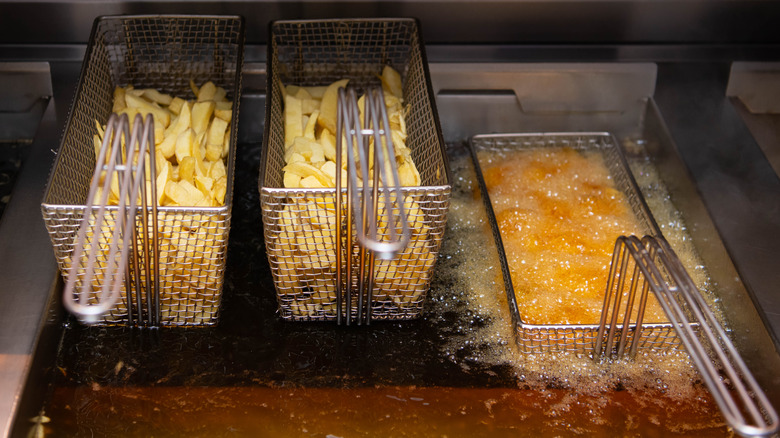After 20 Years Of Research A New Sustainable Frying Oil Is On Its Way
Canadian clean energy company Enezol has announced the development of a new, cleaner cooking oil designed for use in commercial kitchens. According to Food Business News OLICO, which stands for oxidative lipid inhibiting cooking oil, is a series of specialty blended, highly-refined, vegetable-based fry oils which the company claims save money and reduce waste for restaurants. Enezol conducted numerous studies with help from Australian and Japanese research teams, which concluded that the use of OLICO could reduce greenhouse gas emissions and waste oil by 50%. According to Food Business News, a study from the U.K.'s University of Nottingham proved that using 1 kilogram of conventional fry-oil has the carbon footprint equivalent of burning one kilogram of diesel fuel.
After 20 years of development work, Enezol claims that its oil purification process and blend of added plant-based antioxidants are what allows its oil to operate more efficiently, allowing cooks to fry food at a lower temperature and for the oil to last longer under intense heat. As explained by Pitco, once a cooking oil reaches its "smoke point," or the point where it starts to break down and burn, it is spent and needs to be replaced. For common cooking oils like canola or peanut oil, this point is around 400 to 450 degrees F, so an oil blend that can cook at a lower temperature is bound to last longer.
Reducing environmental impact
While fried food is a staple of the restaurant industry, it is unfortunately a rather wasteful process. According to one of OLICO's studies, a restaurant chain with over 100 locations was changing the oil in its fryers three times every two weeks and filtering it daily, consuming 21,600 liters of oil each month. As noted in an article from Eco Friendly Chef Corp., inventors of a fry oil filtration device also meant to reduce waste, extending the life of cooking oil reduces deforestation, lowers carbon emissions, reduces packaging and transportation costs for cooking oil, and also reduces energy consumption.
The OLICO blend of cooking oil, when substituted into the aforementioned restaurant chain, reduced the chain's consumption to 10,800 liters for the month and ended up cutting the restaurants' oil budget in half. Additionally, the chain discovered it was able to lower its fryer temperatures by 5 degrees C. Although the oil blends have been formulated for commercial kitchen use, there is no indication of any brands immediately adopting the new blends or if it will be coming to the U.S. in the near future.

